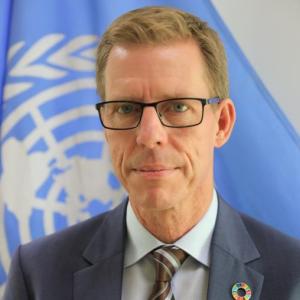Today marks one year since the first case of Covid-19 was confirmed in Jordan. Since that day, more than 372,000 Jordanians have been diagnosed and more than 4,589 have died.
A year ago, very little was known about the disease, its transmission and related response measures. In Jordan, like across the world, the lockdown enforcement, closing businesses and uplifting health facilities to deal with the “invisible enemy” were the immediate measures put in place to control the spread of the virus.
Despite these staggering figures, Jordan’s response has been commendable. Without the Governments swift response, and the immediate and far-reaching support by the collective international community in Jordan, the situation would most certainly have been much worse.
Yet, while responding to the health impact of the pandemic was and is still a priority, its social and economic impact cannot be ignored. Not that it has, but as we go forward this will become even more important. Even when the pandemic will be under control, whenever that is, its impact will remain with us for years to come.
The pandemic has deepened inequalities everywhere and underscored the world’s fragilities. Covid-19 has reversed decades of progress, exacerbated pre-existing vulnerabilities and inequalities.
The virus has impacted each aspect of our lives, from education and learning to the labour markets, from the economy to the environment, from the health sector to our social lives and our phyco-social well-being. As usual, the most vulnerable people and those with little means to cope- like migrants, refugees, the poorest communities- have been hit the hardest. And women have borne the brunt of the pandemic, taking on domestic work during lockdowns, being the largest part of essential frontline workers, leaving jobs to take care of their children or being laid off, and often being victims of increased gender-based violence.
To ease this impact, and to support the Government of Jordan in its response and continue serving the people in Jordan, we at the United Nations mobilized early and comprehensively and pursued a strategy based on three tires: firstly, supporting the Government of Jordan in its response to the immediate health needs; secondly, maintaining and expanding the provision of lifesaving humanitarian assistance to the most vulnerable population; and thirdly, addressing the medium to long term socio-economic consequences of the pandemic.
Of course, responding to the emergency cannot be dissociated from addressing the socio-economic impact of the pandemic.
Since the onset of the crisis, we have intensified our support to refugee and other vulnerable populations, while offering expertise and material assistance to support the national response to the Covid-19 emergency. The United Nations have responded robustly. First and foremost in support to the health sector and the emergency response, but also in support to the education and employment sectors. We have also supported strengthening digital platforms and facilities to ensure people can access services, at a time when restrictions of movements and other response measures did not allow us to conduct a normal life.
While responding to the immediate impact of the pandemic, the United Nations are at the same time working towards setting the foundations for an inclusive, diverse and green recovery and growth. The recovery from the pandemic can be an opportunity to build a stronger, more inclusive, equitable, resilient and sustainable society with youth and women at the centre.
In this journey, the 2030 Agenda, which is underpinned by human rights, remains as relevant as ever, providing us with the ultimate vision and showing us the way to build forward better for Jordan’s future generations.
Fortunately, today we have a vaccine. This is a great hope, but it will take time to make it available and affordable to all, and it requires international cooperation. But we should not ease up on preventive measures before the vaccine is widely available and to adhere to the key public health measures: masks, social distancing, avoidance of crowds. No time for complacency.
It is our shared challenge and shared responsibility. And we all have a role to play to make our tomorrow better, more inclusive, equitable and sustainable. We need to seize the Covid moment and learn from the past, building forward better, together.










